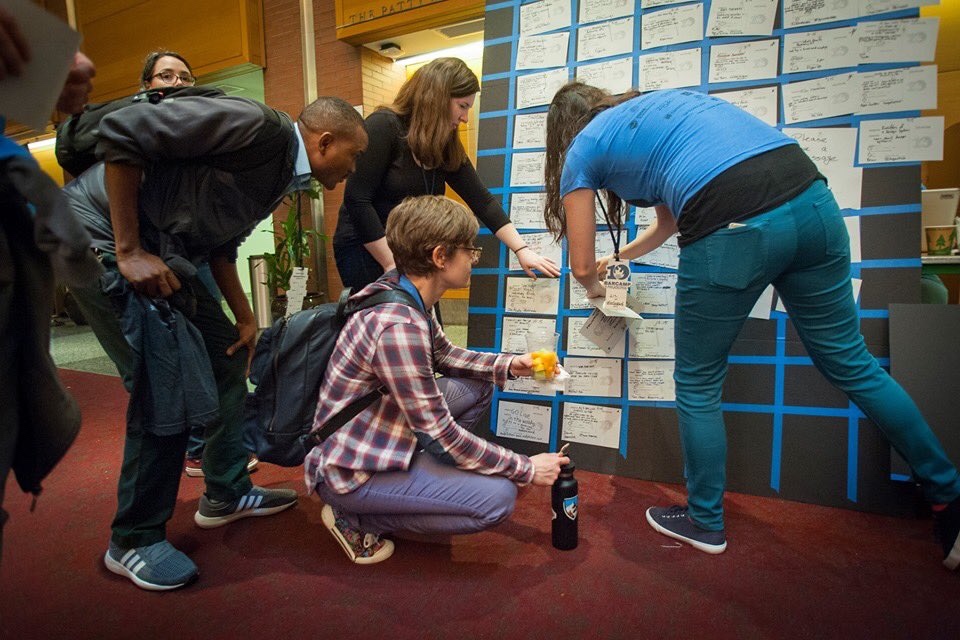“No matter where you’re from, how you identify, or what you need to feel comfortable and safe,” the tweet reads, “we’ve got you. BarCamp Philly’s inclusivity mission is a 12-year evolution as our community has evolved.”
Tomorrow is the 12th annual BarCamp Philly, to be held at The Wharton School’s Huntsman Hall. The unconference event lets participants propose and conduct the sessions. Attendees post ideas in the morning, and lead the sessions throughout the day.
Ahead of the event, organizers took to Twitter on Thursday afternoon to share how they’re thinking intentionally about keeping the tech event inclusive to attendees of different genders, abilities and life experiences.
Why?
“Because it’s the right thing to do,” wrote organizers Briana Morgan and Amanda Renzulli via Slack message. “BarCamp has always been an event that encourages anyone in the community to have a voice, and gives them a platform to volunteer or lead a session and be heard.”
Features introduced this year — some in partnership with venue sponsor Wharton — include signage for a gender-neutral bathroom, gender-neutral terminology and expanded sizes for t-shirts, lactation suites, a KidCamp area for children, and quiet spaces for those who experience sensory overload. Pronoun stickers for badges are returning after their 2018 introduction.
“Often these changes are made because someone has requested them,” said Morgan and Renzulli, who organize the event along with Brian Crumley, Maurice Gaston and Joe Campbell. “A couple of them have been based on requests we’ve gotten. Some of them have come from what we as organizers have seen other conferences and communities doing.”
The thread caught our eye because of how clearly it states the steps taken by organizers to create a space to meet different needs. Check out a few:
3. We introduced pronoun stickers for name badges in 2018. They provide an easy way for attendees to share their pronouns. These are optional, but we hope you’ll consider using a pronoun sticker this year. If you’re not sure why you would, this might help: https://t.co/ptTh6Ffv8a
— BarCamp Philly (@BarCampPhilly) October 17, 2019
5.5. We were able to get a limited number of t-shirts in sizes that weren’t listed in the ticket form. We have a few 3X, 3XT, and 4X straight-cut shirts available – just ask at the registration desk. We hope we have enough for everyone. We'll include these sizes in 2020 planning.
— BarCamp Philly (@BarCampPhilly) October 17, 2019
7. We're working on a “KidCamp” in the drum area of the forum, thanks to some wonderful volunteers and parents. Please do not consider it official conference childcare. But, expect to see an evolution of the opportunities for our littlest BarCampers this year!
— BarCamp Philly (@BarCampPhilly) October 17, 2019
The organizing team is already thinking ahead to next year.
“We would like to hear what our attendees, sponsors and volunteers think about this year’s changes,” Morgan and Renzulli said. “And we’d like to continue to see accessibility improvements in 2020, like real time captioning for at least some talks, ASL translation and a more accessible after party. As we are a community-driven, sponsor-funded event, everything we do is funded by ticket sales and the companies that support us year over year.”
Join the conversation!
Find news, events, jobs and people who share your interests on Technical.ly's open community Slack

Philly daily roundup: Student-made college cost app; Central High is robotics world champ; Internet subsidy expiration looms

Philly daily roundup: Earth Day glossary; Gen AI's energy cost; Biotech incubator in Horsham

Philly daily roundup: Women's health startup wins pitch; $204M for internet access; 'GamingWalls' for sports venues


